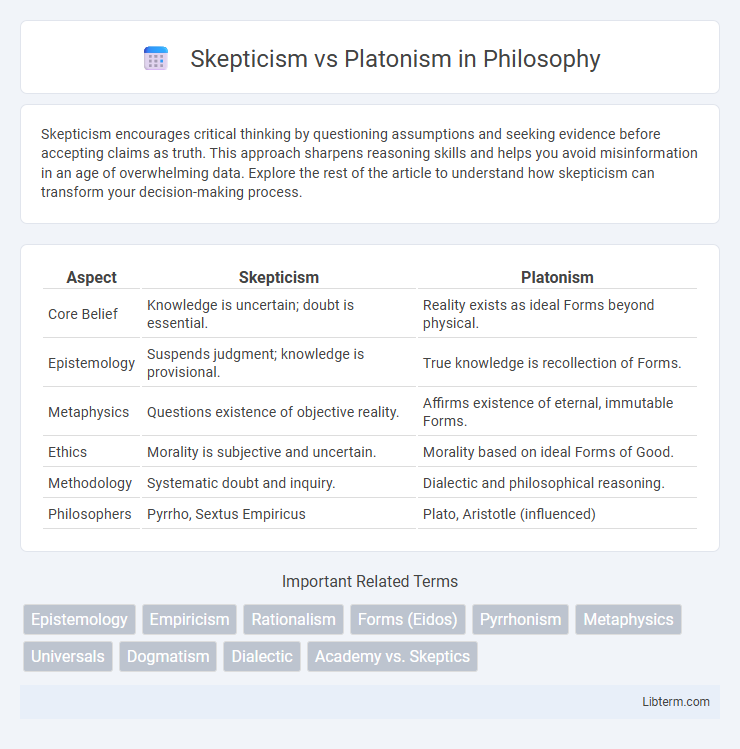Skepticism encourages critical thinking by questioning assumptions and seeking evidence before accepting claims as truth. This approach sharpens reasoning skills and helps you avoid misinformation in an age of overwhelming data. Explore the rest of the article to understand how skepticism can transform your decision-making process.
Table of Comparison
| Aspect | Skepticism | Platonism |
|---|---|---|
| Core Belief | Knowledge is uncertain; doubt is essential. | Reality exists as ideal Forms beyond physical. |
| Epistemology | Suspends judgment; knowledge is provisional. | True knowledge is recollection of Forms. |
| Metaphysics | Questions existence of objective reality. | Affirms existence of eternal, immutable Forms. |
| Ethics | Morality is subjective and uncertain. | Morality based on ideal Forms of Good. |
| Methodology | Systematic doubt and inquiry. | Dialectic and philosophical reasoning. |
| Philosophers | Pyrrho, Sextus Empiricus | Plato, Aristotle (influenced) |
Introduction to Skepticism and Platonism
Skepticism challenges the certainty of knowledge by questioning the possibility of absolute truth and emphasizing continuous inquiry. Platonism asserts the existence of objective, immutable Forms or Ideas that represent true reality beyond sensory experience. The contrast lies in Skepticism's doubt about knowledge claims, while Platonism affirms the existence of eternal truths accessible through reason.
Historical Roots of Skepticism
Skepticism traces its historical roots to ancient Greek philosophers like Pyrrho of Elis and Sextus Empiricus, who questioned the certainty of knowledge and emphasized suspension of judgment (epoche). This philosophical stance contrasts sharply with Platonism, which asserts the existence of absolute, eternal Forms as the foundation of true knowledge. While Platonism seeks objective truth through the contemplation of ideal realities, skepticism challenges the reliability of sensory experience and rational inference, highlighting the limitations of human cognition.
Foundations of Platonism
Platonism is founded on the belief in the existence of abstract, immutable Forms or Ideas that represent the true reality beyond the physical world. These Forms serve as the ultimate basis for knowledge, providing objective and eternal standards for truth, beauty, and goodness. Unlike Skepticism, which questions the possibility of certainty, Platonism asserts that genuine knowledge arises from intellectual insight into these unchanging essences.
Core Differences: Belief vs. Doubt
Skepticism centers on doubt and suspending judgment due to the lack of certain knowledge, emphasizing continuous questioning and the limitations of human understanding. Platonism asserts the existence of abstract, immutable Forms or Ideas as true reality, advocating belief in these eternal truths beyond sensory experience. The core difference lies in Skepticism's reliance on doubt as a method, while Platonism commits to belief in an objective metaphysical realm.
Skepticism and the Nature of Knowledge
Skepticism challenges the certainty of knowledge by questioning the possibility of absolute truth, emphasizing continuous inquiry and doubt. It asserts that human perception and reasoning are fallible, thereby preventing definitive knowledge claims. This philosophical stance influences epistemology by highlighting the limits of human cognition and promoting critical examination of beliefs.
Platonism and the World of Forms
Platonism centers on the World of Forms, an abstract realm where perfect, unchanging archetypes of all objects and concepts exist independently of the material world. These Forms represent the true reality, offering a foundation for knowledge that contrasts with the ever-changing sensory experiences highlighted by Skepticism. Understanding the World of Forms enables access to objective truths beyond empirical observation, affirming permanent essences that shape the nature of existence.
Key Philosophers: Influencers of Each Doctrine
Skepticism is primarily shaped by Pyrrho of Elis, who emphasized suspending judgment to achieve mental tranquility, and Sextus Empiricus, whose writings systematically outlined skeptical methods. Platonism is fundamentally influenced by Plato, whose theory of Forms asserts an immutable realm of ideal entities, and his student Aristotle, who developed metaphysical frameworks that further shaped Platonic thought. The contrasting approaches of these philosophers highlight the epistemological divide, with skeptics questioning knowledge claims and Platonists affirming transcendent truths.
Impact on Modern Philosophy and Science
Skepticism challenges the certainty of knowledge, fostering critical inquiry and promoting empirical investigation in modern philosophy and science. Platonism, emphasizing abstract forms and universal truths, influences the development of mathematical realism and theoretical frameworks in physics. The interplay between these philosophies drives ongoing debates on the nature of reality, knowledge, and scientific truth.
Contemporary Debates: Skepticism vs. Platonism
Contemporary debates between skepticism and Platonism center on the nature of knowledge and the existence of abstract entities, with Platonists asserting the independent reality of universals and skeptics challenging the possibility of certain knowledge about them. Philosophers like Timothy Williamson defend modal Platonism through epistemic principles, while skeptics such as Michael Williams argue that epistemic humility undermines metaphysical commitments to abstract objects. These discussions impact ongoing disputes in metaphysics and epistemology, influencing theories of truth, belief, and the foundations of mathematics.
Conclusion: Relevance in Today’s Intellectual Landscape
Skepticism challenges the certainty of knowledge by emphasizing inquiry and doubt, fostering critical thinking in contemporary debates on truth and belief. Platonism upholds the existence of abstract, immutable forms, influencing modern philosophy, mathematics, and ethics through its assertion of objective realities. The tension between skepticism's questioning stance and Platonism's ontological commitments remains central to ongoing discussions in epistemology and metaphysics.
Skepticism Infographic

 libterm.com
libterm.com